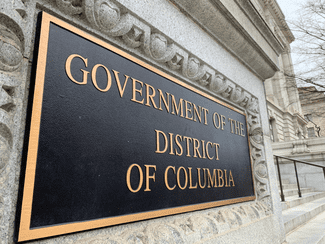D.C. Bans Evictions Over Unpaid Rent Of Less Than $600

Many of the provisions in the bill were already in place, but limited to the public health emergency. For example, D.C. Superior Court already sealed the eviction records of several hundred thousand people due to emergency legislation passed during the pandemic, according to Legal Aid DC. “We know that when folks have records of eviction cases, even if they didn’t end in evictions, that can prevent those people from finding new housing in the future,” says Mel Zahnd, a senior staff attorney in the Housing Law Unit.
Tenant advocates have been calling for some of these changes to the housing law for years. Advocates say the pandemic motivated lawmakers to do what was once considered impossible or impractical. “We know what the outcomes are — the housing market in D.C. has not collapsed,” says Beth Mellen, a supervising attorney in Legal Aid’s Housing Law Unit and the Director of the Eviction Defense Project.
Councilmembers became emboldened to shore up tenant protections after a 2020 report from Georgetown University reported what tenant and landlord advocates long knew: Few cases end in executed evictions because landlords often file just to pressure tenants into paying rent. “That eviction filing goes onto the [public] record,” co-author Eva Rosen told DCist/WAMU at the time. “When future landlords look at tenants’ residential histories, they often don’t care whether it’s a filing or an executed eviction. They just see that there’s some eviction process that was initiated, and that’s the number one red flag for a landlord.”
The bill, titled the Eviction Record Sealing Authority and Fairness in Renting Amendment Act, was first introduced in March 2021. Once the bill is signed into law by Mayor Muriel Bowser, D.C. could see a significant reduction in the number of eviction filings. In 2018, 12% of households summoned to D.C. Superior Court owed less than $600, according to the Georgetown report. Tenant advocates say the bill will improve outcomes for residents, particularly those of color who are disproportionately impacted by evictions and housing instability.
“This really is helping D.C. catch up with all the best practices that are out there to the extent we were missing some of them,” says Mellen. “D.C. already had a lot of other [strong] provisions in the law, like you have to have just cause to evict.”
The bill does a lot more than just ban evictions over modest sums of unpaid rent. Here’s more of what it does:
- Requires landlords to have valid rental registration and licensing to file evictions.
- Requires landlords to notify a tenant in writing of their plans to file evictions over nonpayment at least 30 days before, and then provide the court proof of notice via a photograph. (Lawmakers became aware of the issue following a DCist/WAMU investigation that found hundreds of instances where landlords failed to notify tenants of eviction proceedings.)
- Requires landlords to provide eviction notices in tenants’ native language if they do not speak English or Spanish.
- Instructs D.C. Superior Court to dismiss eviction filings if landlords do not follow necessary steps.
- Instructs the court to seal eviction records 30 days after a case ends if the landlord loses, or three years if the landlord wins.
- Permits people to bring civil cases to court if landlords discriminate against a potential tenant over a sealed eviction filing.
- Requires landlords to tell prospective tenants about their screening process before asking for fees or information.
- Caps application fees at $50. If a screening is not conducted, landlords must refund.
Provisions related to housing vouchers almost did not make it to the final bill. According to tenant advocates, At-Large Councilmember Anita Bonds, who chairs the housing committee, withdrew the bill during last month’s legislative meeting because she said wanted to hear more from housing providers. The provision in question had to do with the screening process for prospective tenants, and was supported by the Council’s Office of Racial Equity. After pushback from advocates, Ward 6 Councilmember Charles Allen introduced an amendment that would, among other things, bar a landlord from considering a prospective tenant’s rental history (including nonpayment of rent) or credit issues if they occurred before the tenant received a housing subsidy.
According to Bonds’ spokesperson Kevin Chavous the councilwoman called for a postponement to receive additional input from tenants, in addition to landlords. He says Bonds did not support any provision checking the rental history of voucher recipients and “wholeheartedly” supported Allen’s amendment.
(The D.C. Human Rights Act already outlaws discrimination based on income, which has failed to deter landlords from refusing to accept housing vouchers and prompted many lawsuits.)
The bill requires help from government agencies. The Office of Human Rights is tasked with ensuring that landlords do not discriminate against voucher holders. “OHR funding has to happen in order for enforcement to be there,” says Brittany Ruffin, senior counsel the Washington Legal Clinic for the Homeless — she estimates it would take roughly $500,000 for the department to enforce the bill. Meanwhile, one provision in the bill depends on the Department of Consumer and Regulatory Affairs to step up enforcement, which it’s historically had problems with. Should the agency (soon to be the Department of Buildings) revoke business licenses from landlords that are repeat offenders, Mellen says then questionable landlords or slumlords won’t be able to file evictions against tenants.
Source: DCist















 Accessibility
Accessibility